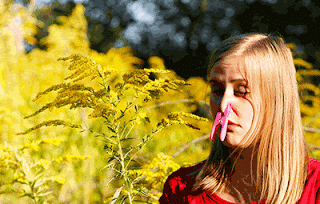Every time you turn around someone you know is complaining
about being allergic to this or allergic to that. Hay fever alone now affects close to 60
million people in the U.S. The more you know about allergies the better you
will be able to manage them. With so much information out there, some of it
conflicting, it is important to know the facts.
True or false?
Cleaner is better.
False
A little dirt and germs are good for us. It builds up your immune system, so you don't
have to endlessly dust and bleach. Instead,
try a vacuum with a HEPA filter, change out your air duct filters and take off
your shoes before you come into the house.
Remember, it’s the small tiny wind-pollinated allergens that cause us
the most irritation. Reduce the pollen
and increase the germs.
True or false? Pollen allergies only affect us in Spring?
False
One of the most common misconception about pollen and
seasonal allergies is that the season is short. The spring allergy season can
actually start in mid-February. There
are generally two peaks with pollen allergies: tree pollen (early in the
season) and then the grass pollens which come out in late April and early May.
The “Spring” allergy season can run as long as 5 months.
True or false? If you
didn’t have allergies when you were little you won’t have them now that you are
grown.
False
You can develop an allergic reaction to anything at any
time. It begins with exposure. Even if
you've inhaled pollen or mold many times before with no trouble, at some point,
for some reason, the body flags it as an intruder. During this particular
exposure, the immune system studies the allergen. It readies itself for the
next exposure by developing antibodies. Then, the next time you're exposed to
the allergen, your immune system kicks into action, triggering a scratchy
throat or runny nose.
True or false? Only take medications at the start of an
allergic reaction?
False
The best way to get allergy
relief is to take allergy remedies on a regular basis and start before
pollen season hits. Studies have shown
people were able to increase their tolerance and reduce their body’s negative
reaction by exposing themselves to tiny amounts of the allergen.


